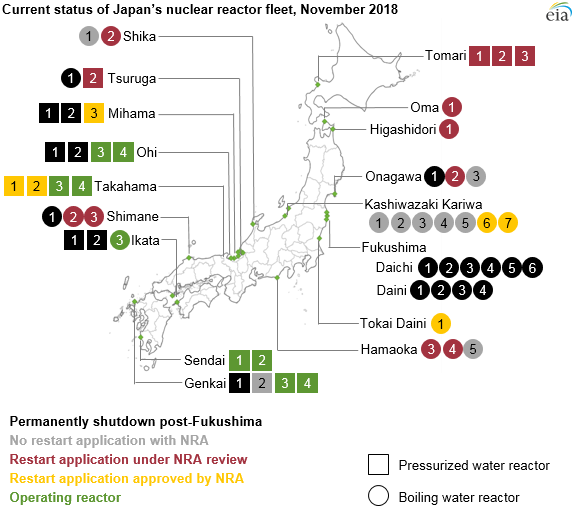In a speech this week, French President Emmanuel Macron talked about the country's future plans for nuclear power, saying France would retire 14 nuclear reactors but on a slower timeline than had been suggested previously.
France is a major player in the nuclear industry: in 2012, about 75 percent of its electricity came from nuclear reactors. But since the Fukushima disaster that same year, the country has been pushing to retire some of its older reactors (although not as aggressively as Germany did). According to Power Magazine, in 2014 France's lower house of parliament passed a bill that would have capped nuclear power at 50 percent of the country's energy mix by 2025. Since then, the cap has been removed and reinstated by legislative bodies, and while reducing nuclear reliance to 50 percent of the country's energy mix seemed to be certain, the timeline to do it was far from certain.
On Tuesday, President Macron said the cap on nuclear energy would be fulfilled by taking 14 older reactors offline by 2035, a more distant goal than the earlier 2025 goal.
Macron also left open the possibility that new reactors might be approved. "Nuclear power now allows us to benefit from low-carbon and low-cost energy. This is a reality, and this is why we will start work on a new regulation of the existing nuclear fleet," the president said, according to Power.
In Macron's speech, he said that France's energy strategy should include ending its reliance on coal by 2022 (an easy feat, given that only 1.8 percent of the country's energy mix currently comes from coal). The strategy, he said, would also include tripling the country's offshore wind capacity. Macron said that France "will commission the first offshore wind farm off Saint-Nazaire," according to Power, and move from there.
"Today, it is wrong to say that nuclear power generation capacity can be replaced by renewable generation capacity; the second is intermittent,” Macron said, per Power. "On the other hand, if we manage to innovate fast enough at the French and European level and have real storage technologies, we will be able to substitute much faster."
Restarting old reactors

As France moves away from nuclear, Japan is slowly turning some of its nuclear reactors back on. After the Fukushima disaster, Japan suspended its nuclear fleet for safety inspection, leaving the country with no nuclear power. Instead, Japan currently burns more coal, oil, and natural gas. In 2015, two reactors came back online for the first time, and a handful of reactors have been approved to reconnect with the grid every year since then.
In 2018, five newer reactors have come back online, more than in all three previous years, according to the Energy Information Administration (EIA). Restart is contingent upon the reactors meeting stricter new rules from Japan's Nuclear Regulation Authority "to address issues dealing with tsunamis and seismic events, complete loss of station power, and emergency preparedness," says the EIA.
Correction: "Vapor" in the caption was changed from "smoke."
[contf] [contfnew] 
Ars Technica
[contfnewc] [contfnewc]






